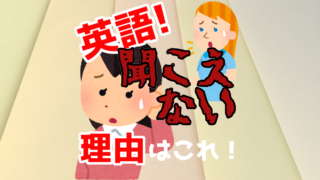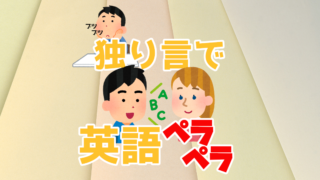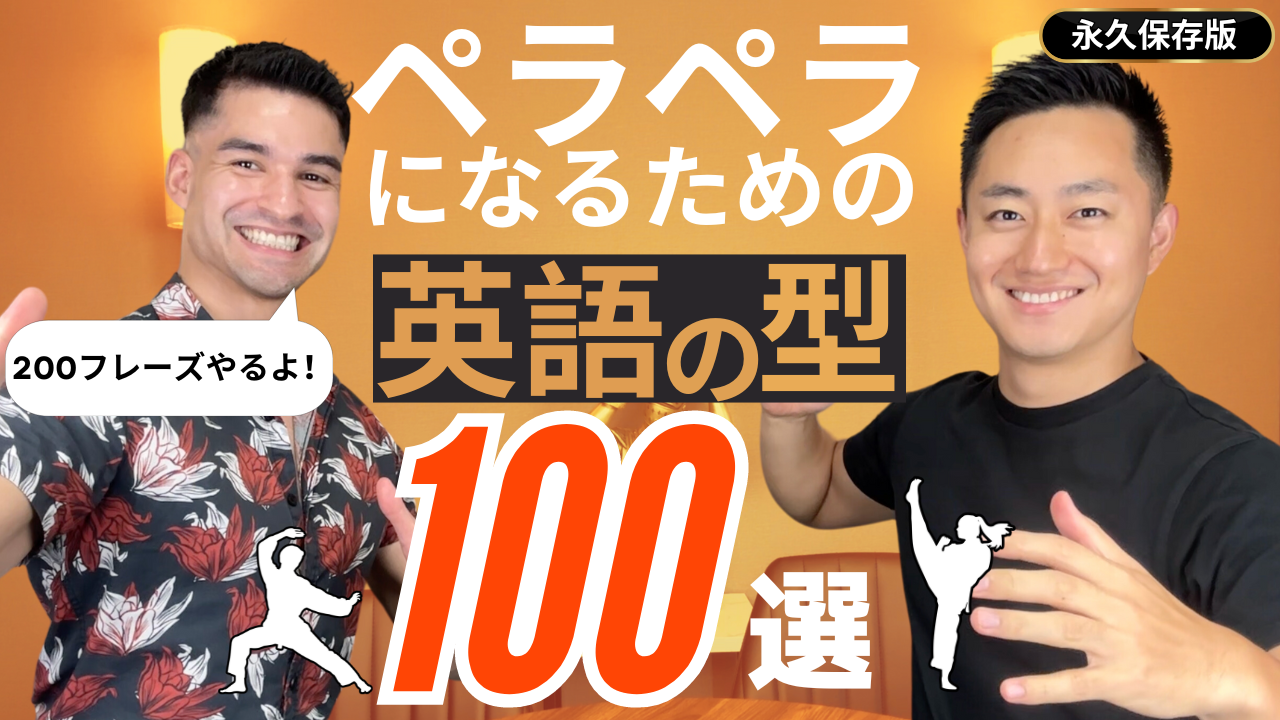この記事では、英会話の勉強を始める際にまず最初に覚えるべき、ネイティブが毎日使う英語の型(パターンフレーズ)を100型〜200フレーズ〜紹介します。
型で覚えることで、自分で文章を考える時間が減り、文章を組み立てる際の混乱もなくなるので、会話の中でより自然に言葉が出てくるようになります。
ぜひ、全ての型を覚えて使いこなしてください!

すなお
Let’s dive in!
- I want to(wanna)~.「〜したい。」
- Do you want to~?「〜しない?」
- I want you to~.「あなたに〜してほしい。」
- Do you want me to~?「〜しようか?」
- I’m gonna~.「〜するつもり。」
- I’d like to~.「〜したいです。」
- I’d like you to~.「あなたに〜してほしいです。」
- Would you like to do?「〜したいですか?」
- Would you like 名詞?「~いかがですか?」
- I have to~.「〜しなければいけない。」
- I must~.「〜しなければいけない。」
- I gotta~.「〜しなきゃ」
- I need to~.「〜する必要がある。」
- You should~.「〜すべきだ。」
- You have to~.「あなたは〜しなければいけない。」
- You’d better~.「〜したほうがいいよ。」
- You must~.「あなたは〜しなければいけない。」
- Let’s~.「〜しよう。」
- Let me~.「〜させて。」
- Let’s not~.「〜しないようにしよう。」
- I’m supposed to~.「〜することになっている。」
- Thank you for~.「〜してくれてありがとう。」
- I’m sorry for~.「〜してごめんなさい。」
- I’m happy to~.「〜して嬉しい。」
- I’m excited to~.「〜するのが楽しみ。」
- I’m sick of~.「〜にうんざりしている。」
- I’m tired of~.「〜に飽き飽きしている。」
- I’m worried about~.「〜が心配だ。」
- I’m glad~.「〜で嬉しい。」
- I feel like~.「〜したい気分だ。」
- I’m looking forward to~.「〜を楽しみにしている。」
- How about~?「〜はどうですか?」
- What do you think of~?「〜についてどう思いますか?」
- There is no~.「〜がない。」
- Is there~?「〜がありますか?」
- Do you have~?「〜はありますか?」
- Do you know~?「〜を知っていますか?」
- I was like,「〜って感じだった。」
- I used to~.「以前は〜していた。」
- I’m used to~.「〜には慣れている。」
- I wonder if~.「〜かなぁ。」
- It’s too…to~.「…すぎて〜できない。」
- I’ve never~.「一度も〜したことがない。」
- Have you ever~?「〜したことがありますか?」
- Do you mind if~?「〜してもいいですか?」
- Do you mind -ing?「〜して頂けますか?」
- I don’t mind~.「〜するのは構わないですよ。」
- I’m about to~.「まさに〜するところです。」
- Make sure to~.「必ず〜してください。」
- I’m planning to~.「〜する予定だ。」
- I didn’t mean to~.「〜するつもりじゃなかった。」
- I can’t help -ing.「〜せずにはいられない。」
- It doesn’t help -ing.「それをしても仕方がない。」
- I wish~.「〜ならいいのになぁ。」
- I hope to~.「〜することを望む。/〜できたらいいな。」
- I should have~.「〜すべきだった。」
- I could have~.「〜できたかもしれない。」
- I would have~.「〜しただろう。」
- I don’t know if~.「〜かどうかわからない。」
- It’s been a long time since~.「〜以来久しぶりだ。」
- ~for the first time in ○.「○年ぶりに〜。」
- It takes ⚪︎ minutes to do.「 〜するのに⚪︎分かかる。」
- How long does it take to~?「〜するのにどれくらいかかりますか?」
- I make someone A.「誰かにAをさせる。」
- I have someone A.「誰かにAをしてもらう。」
- I get someone to do.「誰かに〜をしてもらう。」
- I ask someone to do.「誰かに〜するように頼む。」
- I get~.「〜の状態になる。」
- I’m getting~.「〜になってきた。」
- Can I get~?「〜をもらえますか?」
- I’ll have~.「〜を下さい。」
- Where can I~?「どこで〜できますか?」
- How can I~?「どうやったら〜できますか?」
- What can I~?「何を〜できますか?」
- When can I~?「いつ〜できますか?」
- Can you~?「〜してくれますか?」
- Will you~?「〜してくれますか?」
- Could you~?「〜していただけますか?」
- Would you~?「〜していただけますか?」
- It can’t be~.「〜であるはずがない。」
- It must be~.「〜に違いない。」
- What kind of~?「どんな種類の〜?」
- I stopped -ing.「〜をやめた。」
- I forget to ~.「〜するのを忘れる。」
- I remember-ing.「〜したことを覚えている。」
- As long as~.「〜の限り」
- It’s worth -ing.「〜する価値がある。」
- It depends on~.「〜による。」
- This A is -er than I thought.「このAは思ったより〜だ。」
- This is the best A I’ve ever ~.「これは今まで〜した中で最高のAだ。」
- I’d rather~.「むしろ〜したい。」
- I’d say~.「〜と言える。/ 〜だと思う。」
- I was just thinking~.「ちょうど〜を考えていた。」
- Here is~.「こちら〜です。」
- A isn’t working.「Aがうまく行っていない。」
- I try to~.「〜しようとする。」
- It’s A to do.「〜するのはAだ。」
- Please, ~.「〜してください。」
- It’s my job to do.「〜するのが私の仕事だ。」
- It’s time to~.「〜する時間だ。」
I want to(wanna)~.「〜したい。」
- I wanna watch a movie tonight.「今夜は映画が見たい。」
- I wanna meet your friends.「あなたの友達に会いたい。」
Do you want to~?「〜しない?」
- Do you want to go out for dinner?「夕食を食べに行かない?」
- Do you want to join us?「私たちに参加しない?」
I want you to~.「あなたに〜してほしい。」
- I want you to help me.「あなたに私を手伝ってほしい。」
- I want you to come with me.「あなたに一緒に来てほしい。」
Do you want me to~?「〜しようか?」
- Do you want me to pick you up?「迎えに行こうか?」
- Do you want me to call him?「彼に電話しようか?」
*相手に提案する時に使います。
I’m gonna~.「〜するつもり。」
- I’m gonna start studying.「勉強を始めるつもり。」
- I’m gonna take a nap.「昼寝するつもり。」
I’d like to~.「〜したいです。」
- I’d like to order a pizza.「ピザを注文したいです。」
- I’d like to visit that museum.「その博物館を訪れたいです。」
*I want to~. よりも丁寧に希望を伝えられます。
I’d like you to~.「あなたに〜してほしいです。」
- I’d like you to review this document.「この書類を見直してほしいです。」*check でも可
- I’d like you to be honest with me.「正直に話してほしいです。」
*丁寧に依頼する時に使います。
Would you like to do?「〜したいですか?」
- Would you like to go for a walk?「散歩に行きたいですか?」
- Would you like to have some coffee?「コーヒーを飲みたいですか?」
*丁寧に希望を聞く時に使います。
Would you like 名詞?「~いかがですか?」
- Would you like some tea?「紅茶はいかがですか?」
- Would you like some water?「お水はいかがですか?」
I have to~.「〜しなければいけない。」
- I have to finish my homework today.「今日宿題を終わらせなければいけない。」
- I have to go to the dentist.「歯医者に行かなければならない。」
I must~.「〜しなければいけない。」
1.I must finish my homework today.「今日宿題を終わらせないといけない。」
2.I must finish this report by tomorrow.「明日までにこの報告書を終わらせなければならない。」
何か外的な要因・理由があって「〜しなければいけない。」⇨ have to
自分の中の強い意思があって「〜しなければいけない。」⇨ must
I gotta~.「〜しなきゃ」
- I gotta go now.「もう行かなきゃ。」
- I gotta clean my room.「部屋を掃除しなきゃ。」
*have toとほとんど同じ意味で使える。若干カジュアルな言い方になります。
I need to~.「〜する必要がある。」
- I need to buy groceries.「食料品を買う必要がある。」
- I need to talk to you.「あなたと話す必要がある。」
You should~.「〜すべきだ。」
- You should see a doctor.「あなたは医者に診てもらうべきだ。」
- You should try this dish.「あなたはこの料理を食べてみるべきだ。」
You have to~.「あなたは〜しなければいけない。」
- You have to wear a seatbelt.「シートベルトをしないといけないよ。」
- You have to finish this by tomorrow.「これを明日までに終わらせないといけないよ。」
You’d better~.「〜したほうがいいよ。」
- You’d better hurry.「急いだほうがいいよ。」
- You’d better not be late.「遅れないほうがいいよ。」
You must~.「あなたは〜しなければいけない。」
- You must follow the rules.「ルールに従わなければいけない。」
- You must be quiet here.「ここでは静かにしなければいけない。」
You should ⇨ 助言や提案の意味で「〜すべきだ」と優しいニュアンスに聞こえる
You have to ⇨ 客観的にみて必要性があるから「あなたは〜しなければいけない」と伝える
You’d better ⇨ 言った通りにしないと、悪いことが起こるから「〜したほうがいいよ。」
You must ⇨ 話し手の強い意見を押し付けるように「〜しなければいけない」
Let’s~.「〜しよう。」
- Let’s go get some ice cream.「アイスクリームを食べに行こう。」
- Let’s watch a movie.「映画を見よう。」
*誰かを誘う時によく使います。”Let’s ice.” や “Let’s movie” にならないように注意しましょう。
Let me~.「〜させて。」
- Let me help you with that.「それを手伝わせて。」
- Let me check my schedule.「スケジュールを確認させて。」
Let’s not~.「〜しないようにしよう。」
- Let’s not argue.「喧嘩しないようにしよう。」
- Let’s not worry about it.「それについて心配しないようにしよう。」
I’m supposed to~.「〜することになっている。」
- I’m supposed to see him at 5.「5時に彼と会うことになっている。」
- I’m supposed to finish this today.「これを今日終わらせることになっている。」
Thank you for~.「〜してくれてありがとう。」
- Thank you for your help.「手伝ってくれてありがとう。」
- Thank you for the gift.「プレゼントをありがとう。」
I’m sorry for~.「〜してごめんなさい。」
- I’m sorry for being late.「遅れてごめんなさい。」
- I’m sorry for the inconvenience.「ご不便をおかけしてすみません。」
I’m happy to~.「〜して嬉しい。」
- I’m happy to help you.「あなたを手伝えて嬉しい。」
- I’m happy to see you.「あなたに会えて嬉しい。」
I’m excited to~.「〜するのが楽しみ。」
- I’m excited to start my new job.「新しい仕事を始めるのが楽しみ。」
- I’m excited to visit Japan.「日本を訪れるのが楽しみ。」
I’m sick of~.「〜にうんざりしている。」
- I’m sick of this weather.「この天気にうんざりしている。」
- I’m sick of waiting.「待つのにうんざりしている。」
I’m tired of~.「〜に飽き飽きしている。」
- I’m tired of this job.「この仕事に飽き飽きしている。」
- I’m tired of his excuses.「彼の言い訳に飽き飽きしている。」
I’m worried about~.「〜が心配だ。」
- I’m worried about my exam results.「試験の結果が心配だ。」
- I’m worried about you.「あなたのことが心配だ。」
I’m glad~.「〜で嬉しい。」
- I’m glad you came.「あなたが来てくれて嬉しい。」
- I’m glad it’s over.「それが終わって嬉しい。」
I feel like~.「〜したい気分だ。」
- I feel like going for a walk.「散歩したい気分だ。」
- I feel like eating something sweet.「甘いものを食べたい気分だ。」
I’m looking forward to~.「〜を楽しみにしている。」
- I’m looking forward to the weekend.「週末を楽しみにしている。」
- I’m looking forward to seeing you.「あなたに会うのを楽しみにしている。」
How about~?「〜はどうですか?」
- I’m going to the party. How about you?「私はパーティーに行くよ。あなたはどうですか?」
- How about going to the beach this weekend?「今週末ビーチに行くのはどうですか?」
*相手の意見や考えを聞く時、もしくは提案する時に使います。
What do you think of~?「〜についてどう思いますか?」
- What do you think of this idea?「このアイデアについてどう思いますか?」
- What do you think of the new policy?「新しい方針についてどう思いますか?」
There is no~.「〜がない。」
- There is no big difference.「大きな違いはない。」
- There is no time left.「時間が残っていない。」
Is there~?「〜がありますか?」
- Is there a bathroom nearby?「近くにトイレはありますか?」
- Is there any milk in the fridge?「冷蔵庫の中に牛乳はありますか?」
Do you have~?「〜はありますか?」
- Do you have time?「時間はありますか?」
- Do you have any questions?「質問はありますか?」
Do you know~?「〜を知っていますか?」
- Do you know the answer?「答えを知っていますか?」
- Do you know where she is?「彼女がどこにいるか知っていますか?」
I was like,「〜って感じだった。」
- I was like, “Wow! He is awesome.”「私は「うぁ!彼は最高だね。」って感じだったよ。」
- I was like, “I can’t believe it!”「私は「信じられない!」って感じだったよ。」
I used to~.「以前は〜していた。」
- I used to play basketball.「以前はバスケットボールをしていた。」
- I used to live in New York.「以前はニューヨークに住んでいた。」
I’m used to~.「〜には慣れている。」
- I’m used to the noise.「その騒音には慣れている。」
- I’m used to getting up early.「早起きには慣れている。」
I wonder if~.「〜かなぁ。」
- I wonder if it will rain tomorrow.「明日雨が降るかなぁ。」
- I wonder if she’ll come.「彼女は来るかなぁ。」
It’s too…to~.「…すぎて〜できない。」
- It’s too hot to go outside.「暑すぎて外に出られない。」
- It’s too late to call her now.「時間が遅すぎて今彼女に電話できない。」
I’ve never~.「一度も〜したことがない。」
- I’ve never been to Paris.「パリに一度も行ったことがない。」
- I’ve never tried sushi.「寿司を一度も食べたことがない。」
Have you ever~?「〜したことがありますか?」
- Have you ever seen a ghost?「幽霊を見たことがありますか?」
- Have you ever been to Japan?「日本に行ったことがありますか?」
Do you mind if~?「〜してもいいですか?」
- Do you mind if I open the window?「窓を開けてもいいですか?」
- Do you mind if I sit here?「ここに座ってもいいですか?」
Do you mind -ing?「〜して頂けますか?」
- Do you mind helping me?「手伝って頂けますか?」
- Do you mind waiting a moment?「少し待って頂けますか?」
I don’t mind~.「〜するのは構わないですよ。」
- I don’t mind waiting.「待つのは構わないですよ。」
- I don’t mind helping you.「あなたを手伝うのは構わないですよ。」
I’m about to~.「まさに〜するところです。」
- I’m about to leave.「まさに出発するところです。」
- I’m about to start.「まさに始めるところです。」
Make sure to~.「必ず〜してください。」
- Make sure to lock the door.「必ずドアをロックしてください。」
- Make sure to save your work.「必ず作業を保存してください。」
I’m planning to~.「〜する予定だ。」
- I’m planning to visit my parents.「両親を訪ねる予定だ。」
- I’m planning to go shopping.「買い物に行く予定だ。」
I didn’t mean to~.「〜するつもりじゃなかった。」
- I didn’t mean to hurt you.「君を傷つけるつもりじゃなかった。」
- I didn’t mean to say that.「そういうつもりじゃなかった。」
I can’t help -ing.「〜せずにはいられない。」
- I can’t help laughing.「笑わずにはいられない。」
- I can’t help worrying.「心配せずにはいられない。」
It doesn’t help -ing.「それをしても仕方がない。」
- It doesn’t help complaining.「文句を言っても仕方がない。」
- It doesn’t help worrying about it.「それについて心配しても仕方がない。」
I wish~.「〜ならいいのになぁ。」
- I wish I could fly.「空を飛べたらいいのになぁ。」
- I wish it were summer.「今が夏だったらいいのになぁ。」
I hope to~.「〜することを望む。/〜できたらいいな。」
- I hope to see you soon.「すぐに会えることを望む。/ またすぐに会えたらいいな。」
- I hope to get a promotion.「昇進することを望む。/ 昇進できたらいいな。」
I should have~.「〜すべきだった。」
- I should have studied harder.「もっと勉強すべきだった。」
- I should have called you.「あなたに電話すべきだった。」
"shoulda"と発音されることもある。
I could have~.「〜できたかもしれない。」
- I could have won the game.「その試合に勝てたかもしれない。」
- I could have been more careful.「もっと気をつけることができたかもしれない。」
"coulda"と発音されることもある。
I would have~.「〜しただろう。」
- I would have bought that T-shirt if it had been on sale.「もしセールになっていたら、/そのTシャツを買っただろうに。」
- I would have traveled more if I had had more money.「私はもっとお金があったら、もっと旅行していただろう。」
"woulda"と発音されることもある。
I don’t know if~.「〜かどうかわからない。」
- I don’t know if he’ll come.「彼が来るかどうかわからない。」
- I don’t know if it’s true.「それが本当かどうかわからない。」
It’s been a long time since~.「〜以来久しぶりだ。」
- It’s been a long time since we last met.「最後に会って以来久しぶりだ。」
- It’s been a long time since I came here last time.「最後にここに来て以来久しぶりだ。」
~for the first time in ○.「○年ぶりに〜。」
- I saw him for the first time in 5 years.「5年ぶりに彼に会った。」
- I went there for the first time in 10 years.「10年ぶりそこに行った。」
It takes ⚪︎ minutes to do.「 〜するのに⚪︎分かかる。」
- It takes 5 minutes to walk there.「そこまで歩くのに5分かかる。」
- It takes 15 minutes to cook this dish.「この料理を作るのに15分かかる。」
How long does it take to~?「〜するのにどれくらいかかりますか?」
- How long does it take to get to the station?「その駅まで行くのにどれくらいかかりますか?」
- How long does it take to finish this book?「この本を読み終えるのにどれくらいかかりますか?」
I make someone A.「誰かにAをさせる。」
- I make her laugh.「僕は彼女を笑わせる。」
- I make her happy.「僕は彼女を幸せにさせる。」
I have someone A.「誰かにAをしてもらう。」
- I usually have my friend cut my hair.「普段は友達に髪を切ってもらう。」
- I’ll have him call you back.「彼にあなたに電話をかけなおさせます。」
I get someone to do.「誰かに〜をしてもらう。」
- I got him to fix my phone.「彼に私の携帯を直してもらった。」
- I got him to sign the contract.「彼に契約書にサインしてもらった。」
I ask someone to do.「誰かに〜するように頼む。」
- I’ll ask him to call me.「彼に電話するように頼むよ。」
- I asked her to help me with my homework.「彼女に宿題を手伝ってくれるよう頼んだ。」
I get~.「〜の状態になる。」
- I got lost.「道に迷った。」
- I got mad.「私は怒った。」
I’m getting~.「〜になってきた。」
- I’m getting tired. 「疲れてきた。」
- I’m getting hungry. 「お腹がすいてきた。」
Can I get~?「〜をもらえますか?」
- Can I get a glass of water?「水を一杯もらえますか?」
- Can I get a receipt?「レシートをもらえますか?」
I’ll have~.「〜を下さい。」
- I’ll have the steak, please.「ステーキを下さい。」
- I’ll have a coffee, please.「コーヒーを下さい。」
Where can I~?「どこで〜できますか?」
- Where can I find a taxi?「どこでタクシーを見つけられますか?」
- Where can I buy this book?「どこでこの本を買えますか?」
How can I~?「どうやったら〜できますか?」
- How can I get to the station?「どうやったら駅に行けますか?」
- How can I fix this problem?「どうやったらこの問題を解決できますか?」
What can I~?「何を〜できますか?」
- What can I do to help?「私は何を手伝えますか?」
- What can I say?「私は何て言ったらいいの?」
When can I~?「いつ〜できますか?」
- When can I see you again?「いつまた会えますか?」
- When can I expect the results?「いつその結果を期待できますか?その結果はいつ頃になりそうですか?」
Can you~?「〜してくれますか?」
- Can you help me with this?「これを手伝ってくれますか?」
- Can you give me a ride?「車で送ってくれますか?」
Will you~?「〜してくれますか?」
- Will you marry me?「結婚してくれますか?」
- Will you come to the party?「パーティーに来てくれますか?」
Can you~? ⇨ 可能かどうかを聞く
Will you~? ⇨ 相手がある行動を取ることが可能とわかった上で相手が行動してくれるか意思を聞く
Could you~?「〜していただけますか?」
- Could you help me?「手伝っていただけますか?」
- Could you tell me the time?「時間を教えていただけますか?」
Would you~?「〜していただけますか?」
- Would you mind closing the door?「ドアを閉めていただけますか?」
- Would you join us for dinner tonight?「今夜の夕食に参加して頂けませんか?」
Could you~? と Would you~? はそれぞれ
Can you~? と Will you~? を丁寧にしたニュアンスになります。
It can’t be~.「〜であるはずがない。」
- It can’t be true.「それが本当のはずがない。」
- It can’t be that difficult.「それがそんなに難しいはずがない。」
It must be~.「〜に違いない。」
- It must be love.「それは愛に違いない。」
- It must be hard for you.「それはあなたにとって大変に違いない。」
What kind of~?「どんな種類の〜?」
- What kind of music do you like?「どんな種類の音楽が好きですか?」
- What kind of food is this?「これはどんな種類の食べ物ですか?」
I stopped -ing.「〜をやめた。」
- I stopped smoking.「タバコをやめた。」
- I stopped worrying about it.「それについて心配するのをやめた。」
I forget to ~.「〜するのを忘れる。」
- I forgot to lock the door.「ドアに鍵をするのを忘れた。」
- I forgot to call her.「彼女に電話するのを忘れた。」
I remember-ing.「〜したことを覚えている。」
- I remember meeting you.「あなたに会ったことを覚えているよ。」
- I remember talking to you about the project.「あなたにそのプロジェクトについて話したことを覚えているよ。」
As long as~.「〜の限り」
- As long as you’re happy, I’m happy.「あなたが幸せなら、私も幸せだよ。」
- As long as we finish on time, it’s fine.「時間通りに終われば、それで大丈夫です。」
It’s worth -ing.「〜する価値がある。」
- It’s worth reading.「読む価値がある。」
- It’s worth visiting.「訪れる価値がある。」
It depends on~.「〜による。」
- It depends on the weather.「天気によるね。」
- It depends on the situation.「状況によるね。」
This A is -er than I thought.「このAは思ったより〜だ。」
- This movie is better than I thought.「この映画は思ったより良かった。」
- This test is harder than I thought.「このテストは思ったより難しいよ。」
This is the best A I’ve ever ~.「これは今まで〜した中で最高のAだ。」
- This is the best book I’ve ever read.「これは今まで読んだ中で最高の本だ。」
- This is the best meal I’ve ever had.「これは今まで食べた中で最高の食事だ。」
I’d rather~.「むしろ〜したい。」
- I’d rather stay home.「むしろ家にいたい。」
- I’d rather go for a walk.「むしろ散歩に行きたい。」
I’d say~.「〜と言える。/ 〜だと思う。」
- I’d say it’s a good idea.「それは良いアイディアと言える。」
- I’d say we should wait.「私たちは待つべきだと言える。」
I think より若干控えめに自分の意見を伝える時に使える。
I was just thinking~.「ちょうど〜を考えていた。」
- I was just thinking about you.「ちょうどあなたのことを考えていた。」
- I was just thinking we should leave.「ちょうど出発すべきだと考えていた。」
Here is~.「こちら〜です。」
- Here is the book you asked for.「こちらがあなたが頼んだ本です。」
- Here is the menu.「こちらがメニューです。」
何かを渡す時に使います。
A isn’t working.「Aがうまく行っていない。」
- Your plan isn’t working.「あなたの計画はうまくいっていないよ。」
- WiFi isn’t working here.「ここのWifiはうまく作動してない。」
I try to~.「〜しようとする。」
- I try to exercise every day.「毎日運動しようとしてる。」
- I try to eat healthy.「健康的な食事をしようとしている。」
It’s A to do.「〜するのはAだ。」
- It’s hard to believe.「それを信じるのは難しい。」
- It’s easy to understand.「それを理解するのは簡単だ。」
Please, ~.「〜してください。」
- Please, close the door.「ドアを閉めてください。」
- Please, help me with this.「これを手伝ってください。」
It’s my job to do.「〜するのが私の仕事だ。」
- It’s my job to teach.「教えるのが私の仕事だ。」
- It’s my job to make sure everything is okay.「すべてがうまくいっているか確認するのが私の仕事だ。」
It’s time to~.「〜する時間だ。」
- It’s time to start.「始める時間だ。」
- It’s time to go.「行く時間だ。」

すなお
You did a great job!!
それでは、今日も英会話を楽しんでいきましょう!
That’s it!
本記事の内容を動画で見たい方はこちらもどうぞ!








コメント